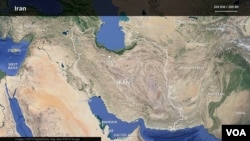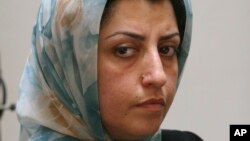
A helicopter carrying Iranian President Ebrahim Raisi suffered a "hard landing" on Sunday, Iranian state media reported, without immediately elaborating.
Raisi was traveling in Iran's East Azerbaijan province. State TV said the incident happened near Jolfa, a city on the border with the nation of Azerbaijan, some 600 kilometers (375 miles) northwest of the Iranian capital, Tehran.
Traveling with Raisi were Iran's Foreign Minister Hossein Amirabdollahian, the governor of Iran's East Azerbaijan province and other officials, the state-run IRNA news agency reported. One local government official used the word "crash" to describe the incident, but he acknowledged to an Iranian newspaper that he had yet to reach the site himself.
Neither IRNA nor state TV offered any information on Raisi's condition.
Rescuers were attempting to reach the site, state TV said, but had been hampered by poor weather conditions. There had been heavy rain and fog reported with some wind. IRNA called the area a "forest."
Raisi had been in Azerbaijan early Sunday to inaugurate a dam with Azerbaijan's President Ilham Aliyev. The dam is the third one that the two nations built on the Aras River. The visit came despite chilly relations between the two nations, including over a gun attack on Azerbaijan's Embassy in Tehran in 2023, and Azerbaijan's diplomatic relations with Israel, which Iran's Shiite theocracy views as its main enemy in the region.
Iran flies a variety of helicopters in the country, but international sanctions make it difficult to obtain parts for them. Its military air fleet also largely dates back to before the 1979 Islamic Revolution.
Raisi, 63, is a hard-liner who formerly led the country's judiciary. He is viewed as a protégé of Iran's Supreme Leader Ayatollah Ali Khamenei and some analysts have suggested he could replace the 85-year-old leader after his death or resignation from the role.
Raisi won Iran's 2021 presidential election, a vote that saw the lowest turnout in the Islamic Republic's history. Raisi is sanctioned by the U.S. in part over his involvement in the mass execution of thousands of political prisoners in 1988 at the end of the bloody Iran-Iraq war.
Under Raisi, Iran now enriches uranium at nearly weapons-grade levels and hampers international inspections. Iran has armed Russia in its war on Ukraine, as well as launched a massive drone-and-missile attack on Israel amid its war against Hamas in the Gaza Strip. It also has continued arming proxy groups in the Mideast, like Yemen's Houthi rebels and Lebanon's Hezbollah.







